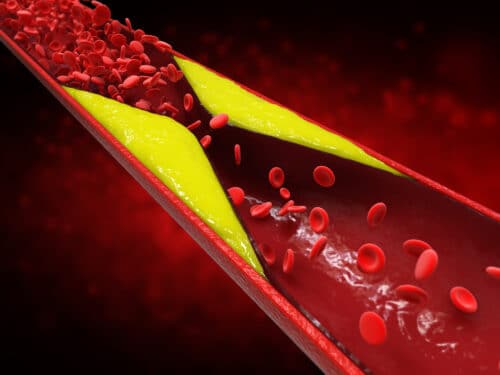
What is Hyperlipidemia?
Hyperlipidemia is the medical term for high cholesterol and according to the CDC, 38% of Americans have cholesterol that is too high. Having high cholesterol means that plaque builds up in your arteries making them narrow. When your arteries begin to narrow, it makes it more difficult for blood to flow and can even block the blood from flowing through your arteries altogether. When the build-up in your arteries breaks off, it can cause stroke or heart attack. Many people may not know that cholesterol is actually a normal part of blood health. Our bodies make all the cholesterol we need for digestion and hormone production but it’s when we add too much additional cholesterol from the foods we eat, that we get into trouble. Cholesterol is found in meat, seafood, poultry, eggs, and dairy products, so it is important to try to consume as little additional dietary cholesterol as possible.
Most people have heard about the good and bad types of cholesterol. LDL, HDL and Triglycerides. LDL is considered the “bad” cholesterol and is what builds up and blocks arteries, HDL is considered the “good” cholesterol and carries LDL cholesterol away from the arteries and back to the liver, where the LDL is broken down and passed from the body. Triglycerides are the most common type of fat in the body and in combination with high LDL or low HDL, is a harmful combination.
Common causes and results of Hyperlipidemia
Hyperlipidemia is dangerous and can cause life-threatening events and conditions like coronary artery disease, heart attack, stroke, sudden cardiac arrest, and carotid artery disease. For many people, having high amounts of lipids within the bloodstream is a result of an unhealthy lifestyle and diet high in saturated and trans fats, but it can also be caused by family history, other diseases and age. Other causes of Hyperlipidemia include:
- Smoking
- Diabetes
- Kidney Disease
- Pregnancy
- Drinking too much alcohol
- Underactive thyroid gland
- Not enough exercise
- Obesity
What can be done?
There are no signs of high cholesterol until it is too late. The only way to find out what your cholesterol levels are is through a blood test ordered by your healthcare provider. According to the CDC, most adults should have their cholesterol checked at least every 4 to 6 years but many people have this checked at their yearly physical. People who have heart disease, diabetes or who have a family history of high cholesterol need to get their cholesterol checked more often.
Making lifestyle changes to improve diet, exercising, losing weight, quitting smoking, and limiting alcohol are all steps you can take to reduce cholesterol levels. Sometimes these steps may not be enough and your doctor may prescribe a medication, commonly a statin drug, to help.
What can Med First do to help?
Since the only way to check your cholesterol is through a blood test, all Med First locations offer on-site lab services, so there is no need to go to a second location to get your blood drawn. We will schedule you for a quick nurse visit to draw your blood after you have been fasting and generally receive the results in 3 days. Once results are in, the Med First provider can work with you to find the best course of treatment for you, whether that be help with lifestyle changes like help quitting smoking, medically assisted weight loss plans, or medication if needed.
Whether you are a new or established patient, if you have a family history of Hyperlipidemia, any of the risk factors listed above or if you just don’t know when you had your last cholesterol check, schedule an appointment with a Med First Provider at any of our locations. For your convenience, you can book an appointment online, no registration needed, or call our appointment center.
Sources:
https://medlineplus.gov/ency/article/000403.htm
https://vascular.org/patients-and-referring-physicians/conditions/hyperlipidemia
